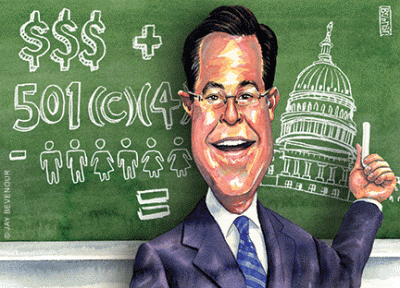
Before its official debut in 2005, Comedy Central’s The Colbert Report first appeared in short “advertisements” aired during Jon Stewart’s Daily Show. In one of these satirical teasers, Stephen Colbert vowed to take his audience “for a spin in the no-fact zone.”
But according to researchers at Penn’s Annenberg Public Policy Center (APPC), the faux-conservative talking head may be “failing” at that objective.
In a study titled “Stephen Colbert’s Civics Lesson,” researchers Bruce W. Hardy G’10, Jeffrey A. Gottfried G’12, Kenneth M. Winneg G’09, and APPC Director Kathleen Hall Jamieson found that, during the last presidential election season, Colbert’s self-proclaimed “no fact zone” educated viewers on campaign-finance reform significantly better than any of the news formats the authors investigated, including CNN, Fox News, MSNBC, broadcast news, talk radio, and newspapers.
The study, based on phone survey data from 1,232 adults interviewed in December 2012, led the authors to suggest that the “narrative structure” underpinning Colbert’s brand of satire was the optimal way to convey the nuances of a complex topic like campaign finance.
After the Supreme Court’s controversial Citizens United ruling, The Colbert Reportbegantackling the issue of campaign financing. In 2011, Colbert created his own
super PAC (which he called “Americans for a Better Tomorrow, Tomorrow”)
as well as a 501(c)(4) “shell corporation.”
As a part of the running joke, Colbert hired former Federal Election Commission chairman Trevor Potter to provide legal counsel on how to use the 501(c)(4) to funnel unlimited anonymous contributions to his super PAC. Colbert even used his super PAC to finance a campaign for the presidency, attempting to get on the ballot in South Carolina, the satirist’s home state.
“Colbert’s treatment of this complex issue did not simply explain the complexities of new campaign finance regulations,” the authors wrote, “but also walked his audience through the detailed process of creating super PACs and 501(c)(4)s. His insertion into the campaign process and real interaction with the legal system, FEC, and mock candidacy allowed him to instruct as he entertained.”
Colbert eventually dissolved his super PAC in November 2012, and with Potter’s help, ostensibly pocketed $800,000 of the funds it had amassed. (In reality, he donated it to charity.)
In a segment that aired on his show in June, Colbert professed to be nonplussed by the Penn study and apologized to his viewers for letting them down. “I never intended to be an educator,” he said. “What’s next? Getting paid like one?”




